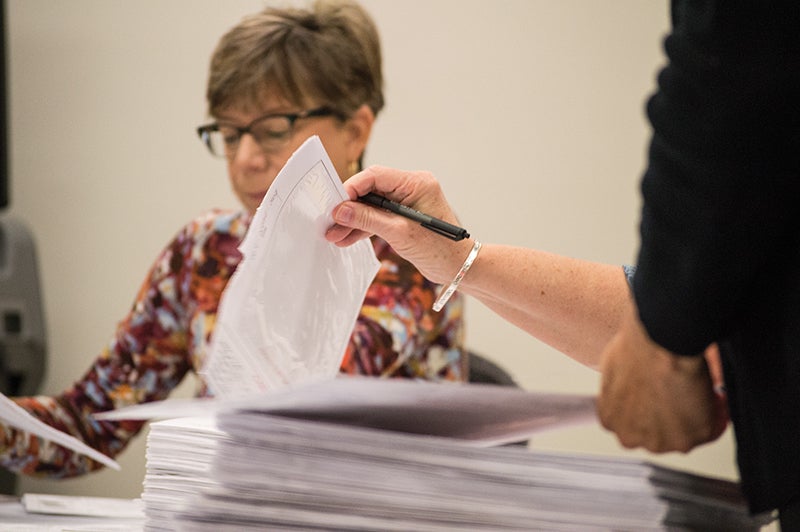Josh Bergeron: Misinformation takes its toll on Rowan Board of Elections
Published 12:05 am Sunday, November 8, 2020

- Board of Elections staff in 2016 tally votes. Salisbury Post file photo
A deluge of unchecked information spreading freely online hasn’t made things any easier for staff at the Rowan County Board of Elections.
Presidential elections always mean more work and stress on the folks charged with setting up and running the infrastructure for local voters. But this year has been more work than usual because of a global pandemic and the precautions it requires, a major expansion of early voting opportunities, voters choosing absentee by mail ballots at historic rates and turnout numbers not seen in decades. That’s not to mention the calls and emails election staff have received raising the specter of fraud.
In the days after the election, her office has been flooded with questions from voters about why their votes were not posted on the state’s website yet. Were their votes actually counted? The misguided theory voters quickly jump to: it must be an example of the widespread fraud that’s found its way into social media feeds largely unchecked.
“That has been half of our day today,” Rowan Elections Director Brenda McCubbins said. “We’ve gotten I don’t know how many calls and emails. … It’s been frustrating.”
It’s particularly frustrating for local elections workers because they strive to run the Rowan County Board of Elections office in a nonpartisan manner, McCubbins said. Staff at the office take pride in working to stay neutral in partisan disputes. And they aren’t people in far-flung places deciding how our local elections end up. They are our neighbors — shopping at the same grocery stores, enjoying the same community events, sending kids to school at local institutions and going to church down the street.
As for the confusion about voter history, the explanation is simple: staff haven’t been able to upload data into the state’s database yet.
Voters who cast a ballot on Election Day won’t see their voter history reflected on the state’s portal for checking registration until after the canvas, which happens on Nov. 13. That’s when elections officials count any remaining votes, clear up any lingering questions and make the election results official. Those who voted in person during early voting (a form of absentee voting) or by mail can already see their voter history on the state’s portal: vt.ncsbe.gov/reglkup.
Social media is the main way a significant swath of people get news and information, and it’s also a major contributor to rumors running rampant. Facebook will never hire a reporter to write well-researched stories about Salisbury and Rowan County, but people still choose it at significant rates. The Pew Research Center in a July survey found that 18% of people primarily get their news through social media, with other options including news websites, cable TV, local TV, network TV, radio and print newspapers. That 18% is less informed and also less knowledgeable about political news, Pew Research Center found.
But even voters who work to be informed aren’t familiar with the behind-the-scenes work of election staff. How many informed voters, for example, knew that their voter history is updated after the canvassing process? It’s understandable why there’s confusion.
For most people, the most significant education about elections and civic life come via high school and college courses. But those courses do not always get into the small details of how counting votes work.
When voters feed their ballots into tabulators at a polling place, for example, it is not instantly uploaded to a state database — something that is good for election security. Poll workers still need to physically bring vote tabulators to the Rowan County Board of Elections.
In Rowan-Salisbury Schools, individual teachers generally have discretion over how deep they want to go into the election process, says Chad Mitchell, a former county commissioner and teacher at East Rowan High School. Mitchell, who has experienced the local election process first-hand, says he tries to talk about the canvassing process — when bipartisan boards of elections finalize vote tallies and examine any remaining ballots — but it’s an open question just how many adults remember the lessons Mitchell and other civics and government teachers gave when they’re watching election results years later.
“In our current state of society, understanding of government and political systems are pretty important so that you know your rights and how to protect them individually and just so that you can understand what’s going on,” Mitchell said.
For example, Mitchell said, voters probably don’t know that their vote for president is actually for a slate of electors chosen by the state’s political parties. Those slates are chosen during the Democratic and Republican political conventions.
Catawba College politics professor and department chair Michael Bitzer says it’s never been a core component of teaching civics or American politics to discuss the specific process of how votes are counted and results are certified.
That’s because “we’ve never typically had such elections where the partisan divide is so deep, faith and trust in political institutions are abhorrently low, that core American values have been called into serious question, and that educational opportunities for discussing these basic tenants of our democratic-republic governance has been delimited.”
Bitzer says he doesn’t see anything that will bring an end to the bitter partisan divide in the country, but a critical start might be for people to make their own efforts to learn about the intricacies of the electoral process. A good way to start is by tuning into Thursday’s 5:30 p.m. ballot counting meeting of the local board of elections. It can be viewed using the teleconference software Zoom at bit.ly/rowanboe1112. The password is 028147. A full schedule of the Rowan County Board of Elections’ meetings is available at rowancountync.gov/elections.
The truth usually isn’t as simple as the first impression.
Josh Bergeron is editor of the Salisbury Post.

